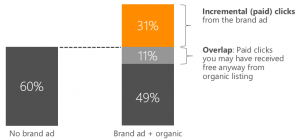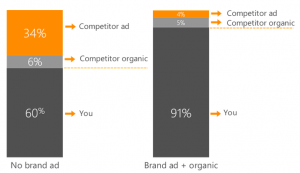Brand Bidding: Should Advertisers Bid on Their Own Brands?
A study conducted by Bing Ads showed the difference in amount of clicks generated by users of the search engine between two different scenarios: advertisers bidding on their own brands versus advertisers not bidding on their own brands. The question being asked here is whether or not there would be a distinct benefit from brands owning both the top ads and organic listings. The study focused separately on both retail and travel brands. The Bing Ads team analyzed 3 million retail results and 400,000 travel results while tracking where searchers click in both above mentioned scenarios.
The results showed that when brands do not have a top ad, 60% went to the top organic listing for retail and 61% went to the top organic listing for travel. On the other hand, when brands do have a top ad, retail brands received 91% to their listing and travel brands received 88%. This is a 31% and 27% difference respectively. Next, Bing Ads followed where those clicks ended up and how they were distributed between ad listing and organic links, in the scenario where brands owned their top ads. They found that for retail, 42% went to ads and 49% went to organic listings. For travel, 45% went to ads and 43% went to organic listings. This in turn showed that there would be an 11% and 18% “overlap” for organic content clicks. In other words, 11% of those retail brand ads would have gone to organic listings anyway, and similarly 18% of the travel brand ads would also have gone to their organic listings. This would mean a 31% and 27% of incremental activity for retail and travel brands (see picture above).
The second part of Bing Ads’ study is how much of the lost clicks would go to the rival ads or rival organic links. From this study they found that if advertisers do not bid their own brand, retail brands will lose 34% of clicks to rival brands’ ads and 6% to rival brands’ organic material. Travel brands will similarly lose 20% of clicks to competitor ads and 19% to competitor organic links. The picture below shows their data in a graph. As a result, Bing Ads’ study did demonstrate that even though brand names already ranks at the top of their organic searches, bidding on their own ads will increase the number of clicks by a sufficient amount and not divert customers’ attentions to competing brands.


